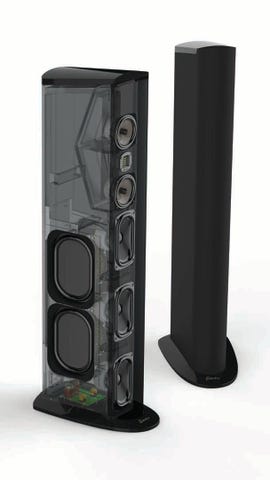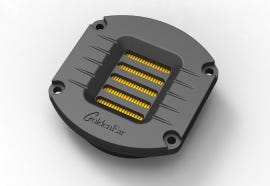The GoldenEar Technology Triton One is a big tower speaker that has what it takes to fill large living spaces with sound. That’s what big speakers do: present music’s scale and power better than small speakers can ever muster. Of course, GoldenEar Technology offers a range of smaller speakers, but there’s no reason why you can’t use Triton Ones in an average size room. Some people really like living with big speakers, regardless of their room’s size.
How big is it? The Triton One stands 54 inches (1.37 meters) high. But since it’s only 5.75 inches (146mm) wide, it’s not as imposing as some hulking towers. The One has a wraparound black cloth grille that covers its front, sides and rear, and there’s a gloss black finished base and top panel.
As you can see from the below cutaway image, the Triton One’s internal design is complex. Each tower has one ribbon tweeter, two 5.25-inch (133mm) midrange drivers, three 5- by 9-inch (127 by 229mm) Quadratic subwoofers and four 7- by 10-inch (178 by 254mm) quadratic passive radiators. The subwoofers are powered by built-in 1,600-watt amplifiers — one for each speaker! GoldenEar Technology’s engineers claim that bass integration with the Triton One’s midrange is far superior to what you can achieve with one or two separate subwoofers placed in the room.

 Enlarge Image
Enlarge ImageThe GoldenEar Technology Triton One speakers
GoldenEar Technology
The Triton One’s connectivity is rather unusual. In addition to the expected speaker binding posts, there’s an RCA “LFE” input jack that can be used with bass management systems in home theaters. Since the Ones include powered subwoofers you’ll need to plug each speaker into a wall outlet.
I like that it’s so easy to set the subwoofers’ volume with the knob on the backside of the Triton One. The control is also useful for fine-tuning the sound of the speakers in different parts of the room. For example, if the right speaker is closer to a room corner than the left speaker, the right speaker’s bass would be reinforced (and made louder) by the corner placement than the left speaker’s bass. With the Triton Ones it’s easy to balance the right and left channel speakers’ bass by adjusting their subwoofer volume controls. The neutral (flat) position for the sub’s volume control is 12 o’clock, and you can adjust the Triton One’s bass level to taste. The speaker’s impedance is rated at 8 ohms.
I started checking out the Triton Ones with the new Lucinda Williams album “The Ghosts of Highway 20,” a heart-breaking collection of tunes. She’s got the blues real bad, and the sound of her voice was absolutely riveting. Bill Frisell and Greg Leisz’s electric guitars shone bright and the big speakers all but disappeared, leaving me alone with Williams and her music. Keith Jarrett’s live solo piano recording “Creation” revealed that the Ones are no less adept with acoustic music.
Next, I put on some acid jazz from St Germain, and right away the Triton Ones’ subwoofers proved their mettle. The fat beats were so deep I literally felt the music through my feet! The pulse was irresistible. Few audiophile speakers in the Triton One’s price class can match its air-moving capabilities. Small bookshelf speakers do many things well, but you need a big speaker to energize a large room (over 500 square feet or 46 square meters) with music played at high volume.


The Triton One’s ribbon tweeter
GoldenEar Technology
With Aphex Twin’s “Syro” electronica album, the Triton One unleashed oodles of swirling, whooshing textures. The stereo imaging was broad and spacious, but focus was a tad soft. Cruising through a pile of acoustic jazz CDs, I found that the treble was clear and refined, while the drums had plenty of kick and power. The Triton One takes on all genres and never falters.
The GoldenEar Technology Triton One costs $5,000, £5,000 or AU$9,495 per pair. If that’s too big or expensive for you, check out GoldenEar Technology’s smaller, but similar Triton Two+ at $3,500, £3,500 or AU$6,595 per pair. Or there’s the Triton Three+ tower speakers at $2,500, £2,500 or AU$4,695 per pair.




